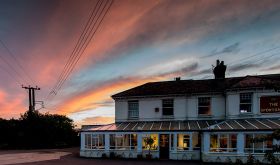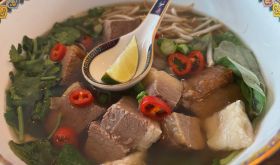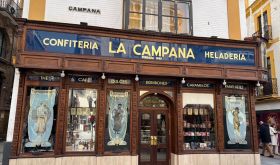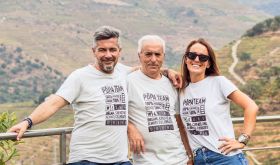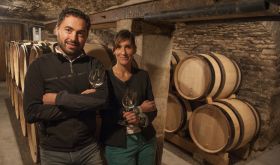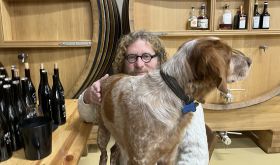Chefs and their suppliers share a common goal – to find and deliver the best to their customers. Neither are initially impelled by money alone. In a chef’s case when fortune arrives it is invariably from the spin-offs around the restaurant rather than the restaurant itself whereas a supplier’s main financial preoccupation is when, or even whether, the restaurants will eventually pay.
Chefs and suppliers are however distinguished by their respective age profiles. While the former tend to mirror sports personalities and have often moved into executive positions by the age of 45, suppliers go on and on, a little wiser and often a lot more philosophical.
Randolph Hodgson, whose Neal's Yard Dairy will soon celebrate 25 years of supplying British cheese to top restaurants in the UK, the USA, France and Japan, has just spent a hectic week taking chefs and the cheese buyers from America’s Whole Foods (who have now taken over Fresh & Wild in the UK) around the country. Julian Birch is still physically delivering wet, heavy boxes of the freshest fish from the south coast to London’s restaurants more than twenty years since I first bought from him although, as testimony to quite how precarious this business is, he is now involved with his seventh different company.
As befits her character Wendy Sayell has created a more idiosyncratic business model to ensure that her company Sayell Foods, which supplies over 250 restaurants, gastro-pubs and a few private customers across the UK and Ireland with a range of over 400 different Spanish ingredients and ceramics, has a long life.
She started the company when she was in her mid-fifties – in response to demands from chefs for better quality produce at lower prices – by which time she had a son James and daughter Camilla who not only share her enthusiasm but are also prepared to load their vans at a moment’s notice with anything a chef has just phoned up for.
I met Sayell at her Victorian warehouse in fashionable Hoxton, north London, and was greeted by a still strikingly good looking woman, although now over 60, in a dashing skirt and mules. The untidiness of the office and the presence of a dog by her feet gave the room the feel more of a theatrical agency than a major food supplier although the poster for a bullfight confirmed that here is a little outpost of Spain. Her comment, as she lit a cigarette, that “I suppose I will have to give these up pretty soon” suggested a no-nonsense disposition.
“I first went to Torremolinos when I was 18 in the early 1960s when it was underdeveloped, beautiful and stylish. I furnished apartments for a while and then we started a restaurant on the beach where, without running water or electricity, we used to serve a hundred lunches a day. That is when I began to appreciate that this part of the world has the best raw ingredients even if they know how to cook only fish really well.”
Family life intervened but then she was approached by the chef at The Eagle, the seminal gastro-pub in Farringdon, to see whether she could put her knowledge of Spain to commercial use. “The chef thought he was being overcharged for his piquillo peppers and Judión beans and I discovered that I could supply him at five pounds a kilo cheaper and still make a profit. I started from home – by then I was too old, too set in my ways to work for anyone else,” she added with a smile.
Her business grew as more and more chefs came to her to source the best produce. “We are bugged by chefs all the time,” she explained with some pride. “One of our biggest selling lines is Harina de Trigo, flour which Spanish chefs specifically use for frying fish which is coarser than British flour so it coats the fish more evenly. Sam Hart from Fino asked me to track it down after he had spent a year in Spain and now we deliver it in 40 kilo lots to J.Sheekey, the very English fish restaurant in Covent Garden.”
Two particular characteristics have contributed to Sayell’s success. The first is the maternal aspect she brings to her business. Chefs know that they can trust her and she, in turn, seems to look on them rather like her extended family who may survive without her advice but not quite so well. When talking about one chef about to set up a fish and chip shop where they will fry the fish in olive oil (supplied by her company, naturally) as they do in Spain, she did refer to him as ’a very nice boy’. And she has just placed two of Jamie Oliver’s trainee chefs in the kitchens of El Portalon in Marbella for an immersion in Spanish cooking.
Since becoming an important part of the business, James has acquired a more commercial perspective. “We look at those who supply the small restaurants and delicatessens in Spain and only deal with family-owned, artisanal companies. The key is that they must be family-owned rather than their size. If we are talking to the owner of a company we can persuade them occasionally to adapt one of their products to suit British chefs but you cannot do that if you have to deal with an export manager.”
Recommendations from chefs and suppliers in Spain have taken Sayell to places she didn’t think possible seven years ago. “I've been into the kitchens of Goldman Sachs, Credit Suisse and Diageo to show them how to cook tortilla properly. And an introduction to a small family ceramic business, where father and son make and mother and daughter decorate, led to us importing a wide range of ceramics. One particular round dish goes to Rowley Leigh for the fish pies in the fish shop next to Kensington Place while another, with three divisions, goes to a cinema that wants to sell food but not have the intrusion of noisy wrapping paper.”
But the biggest surprise has been the popularity of the Serrano ham and suckling pigs she imports from Avila with Britain’s Chinese chefs (although Sayell is quick to point out that correctly they should be called sucking pigs as it is the mother who suckles). “They can no longer import meat directly from China because of the health scares so they buy our Serrano hams and use the meat for dim sum and the fat and bones for stock. And every Chinese celebration seems to call for a suckling pig. I took our supplier (whose brand is, incidentally, called Porky Avila) to one Chinese restaurant last week which had just ordered thirty pigs and he was so thrilled.”
The pleasure that acting as suppliers to British chefs has given the Sayell family is obvious from their enthusiasm not just for what they are currently offering but for the new range of unsmoked Jamón Ibérico, to be grilled or roasted like beef or lamb, which has impressed the chefs they have shown it to and will be appearing on British menus in the autumn.
Wendy Sayell’s cool, dark Victorian warehouse is a long way from the initial sun-drenched beach café in Torremolinos where her passion for food began. But anyone who appreciates the strong, distinctive flavours of Spanish ingredients, whether on restaurant or gastro-pub menus, should be grateful she made the move.
Sayell Foods, 71 Fanshaw Street, London N1, 020-7256 1080, www.sayellfoods.co.uk

